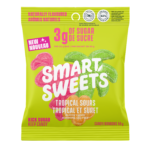
Sugar alcohols, despite their name, aren’t quite the same as the sugar we typically think of. These sweeteners, such as xylitol, erythritol, sorbitol, and mannitol, are commonly used as sugar substitutes in various products, from chewing gum to sugar-free candies and even some beverages. But what exactly are sugar alcohols, why are they so prevalent in the food industry, and are there any health concerns associated with their consumption?
What are Sugar Alcohols?
Sugar alcohols are a type of carbohydrate that occurs naturally in certain fruits and vegetables but can also be produced industrially from sugars. Chemically, they are hybrids of sugar molecules and alcohol molecules, hence the name “sugar alcohols.” Despite their sweet taste, they differ from both sugars and alcohols in their chemical structure and how they affect the body.
Why are they used?
These sweeteners are popular in the food industry for several reasons. Firstly, they provide sweetness without as many calories as sugar, making them attractive options for those looking to reduce their calorie intake or manage their blood sugar levels, such as individuals with diabetes. Additionally, sugar alcohols are less likely to cause tooth decay compared to regular sugar, as they don’t feed the bacteria in the mouth in the same way sugars do.
Moreover, sugar alcohols generally have a lower impact on blood sugar levels compared to regular sugar, which can be beneficial for people with diabetes or those following a low-carb diet. This makes them valuable ingredients in sugar-free and low-carb products, allowing consumers to indulge in sweet treats without experiencing the same spike in blood sugar.
Do they cause tummy troubles?
While sugar alcohols have their benefits, they are not without drawbacks. Consuming large amounts of sugar alcohols can lead to gastrointestinal issues such as bloating, gas, and diarrhea, as they are not completely absorbed by the body and can ferment in the gut. Different sugar alcohols have varying degrees of laxative effects, with some being better tolerated than others.
Furthermore, although they have fewer calories than sugar, sugar alcohols are not entirely calorie-free and can still contribute to calorie intake if consumed in excess. Some research also suggests that certain sugar alcohols may have a laxative effect when consumed in large amounts, leading to gastrointestinal discomfort.
SmartSweets do not contain sugar alcohols (including erythritol – our stevia does not include erythritol as filler). Sugar alcohols are often used in the food industry to push down the net carb count. We think that this comes at way too high a cost to our bodies and we want SmartSweets to be tummy friendly! Our pinky promise to you is delicious candy you know and love with no artificial sweeteners, added sugar or sugar alcohols.
Learn more about SmartSweets.
